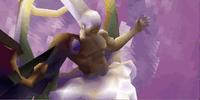Flare / Megaflare / Gigaflare
| Flare/Megaflare/Gigaflare | |
|---|---|
{{{content1}}}
{{{content2}}}
{{{content3}}} Sephiroth using Flare, Megaflare, and Gigaflare in Ultimate. | |
| User | Sephiroth |
| Universe | Final Fantasy |
Flare (フレア, Flare) is Sephiroth's neutral special move. In a similar manner to Thunder and Frizz, it can be charged up to Megaflare (メガフレア, Megaflare) and then Gigaflare (ギガフレア, Gigaflare) before being released.
Overview
All three versions of the move launch a projectile that travels horizontally. The projectile will explode upon hitting an opponent, the stage, or another projectile, or after travelling a certain distance. The charge can be cancelled during the Flare and Megaflare stages with the shield or jump button, but this simply stops the move; the charge cannot be stored for later.
Flare is a large red fireball that moves slowly and travels about two-thirds length of Final Destination. Its slow speed allows Sephiroth to combo into or off it, similar to King K. Rool's Blunderbuss. While Flare has fairly high base knockback, it has poor knockback scaling. This makes it difficult to KO onstage even at high percents, though it still has reasonable offstage KO capabilities.
Megaflare is a stronger blue fireball that moves faster but covers just under half the distance as Flare. Unlike Flare, Megaflare boasts impressive kill power, being able to KO at ledge starting at 100%, and even earlier offstage. The explosion is also multihit and lingers for longer.
Gigaflare is a small sparkling projectile that results in a large and extremely powerful explosion, though barely traveling past melee range. However the ensuing explosion is able to hit opponents nearly halfway across Final Destination. The explosion is the strongest at the center, being able to KO as low as 20%, while the outer edges vary in kill power but deals respectable knockback regardless. In Winged Form, it is capable of KO'ing certain characters at 0% at ledge, as well as breaking a full shield. With proper spacing, Sephiroth is able to combo off Gigaflare's explosion, namely with grab, forward tilt and forward smash. The latter is notable for being able to potentially KO at 0%, making it a deadly shield break punish.
Due to their long startup, all three attacks are impractical as conventional projectiles. Instead being more useful as long range pressure, or used to bait opponents by cancelling the charge. Charging Flare at ledge is extremely potent at dealing with recoveries. Flare and Megaflare can be used against an offstage opponent, as they are both travel a good distance and have strong kill power. When given time to setup, Gigaflare can cover a huge area at the ledge, allowing for early kills or launching them off stage again. Additionally Gigaflare can potentially cover every possible ledge option, though it can be avoided with good timing. The charge can also be cancelled if the opponent attempts to avoid the projectile for further pressure.
While moving, the projectile can be reflected and absorbed normally. However, the explosion itself is not considered a projectile and cannot be reflected or absorbed. Spacing is crucial when using a reflector or absorber, as they will not offer any protection against the damaging explosion. Absorbing the projectile will only heal based on damage that the projectile would do. This is most noticeable when absorbing Gigaflare, which does much of its damage through the explosion, thus only healing a minuscule amount. Reflectors, however, will increase the power of both the projectile and explosion. A reflected Gigaflare is strong enough to instantly KO.
When releasing Megaflare, Sephiroth may say 行け ("Go.") and, when releasing Gigaflare, he may say 焼き尽くす ("Burn to nothing."). Releasing Gigaflare will also cause the screen to slightly darken.
Instructional Quotes
| Hold the button down to charge; release to launch a fireball. Charging longer reduces the range but increases the explosion size. |
Origin

Flare first appeared in Final Fantasy — originally localized under the name NUKE — where it was a high-level Black Magic spell. Despite its name and appearance, it is often listed as a non-elemental spell. However, in Final Fantasy VII, it appears as a fire-elemental spell (which is reflected in its Super Smash Bros. appearance). Safer∙Sephiroth uses Flare in the original Japanese version of Final Fantasy VII; in the English version, this was changed to the similar move Shadow Flare. It can also used by the party by using the Contain Materia.
Megaflare first appeared in Final Fantasy III as an attack used by Bahamut; it has since come to be known as the dragon's signature attack in every game it appears in, often shown as a massive explosion or destructive beam of energy fired from its mouth. In a few rare instances, most notably the Kingdom Hearts series, it is available as a standalone spell.
Gigaflare first appeared in Final Fantasy V as the demon Twintania's most powerful attack. It would later appear in Final Fantasy VII as Neo Bahamut's attack, and like Megaflare, would come to be closely associated with more powerful strains of Bahamut, though other monsters like the Archeodemon and Enuo would have access to it in their repertoire.
Flare is actually more powerful than both Megaflare and Gigaflare in Final Fantasy VII, with 115 power compared to 65 and 80 power, respectively.
Gallery
Sephiroth using Flare as shown by the Move List in Ultimate.
Casting Flare on Dracula's Castle.
Names in other languages
Trivia
- Sephiroth has currently never used both Megaflare or Gigaflare in any Final Fantasy game.
- Teraflare, another form of Flare, is used by Bahamut ZERO in Midgar.
- Similar to Terry's Buster Wolf and Power Geyser, Gigaflare briefly flashes a dark color that is unrelated to Special Zoom.



